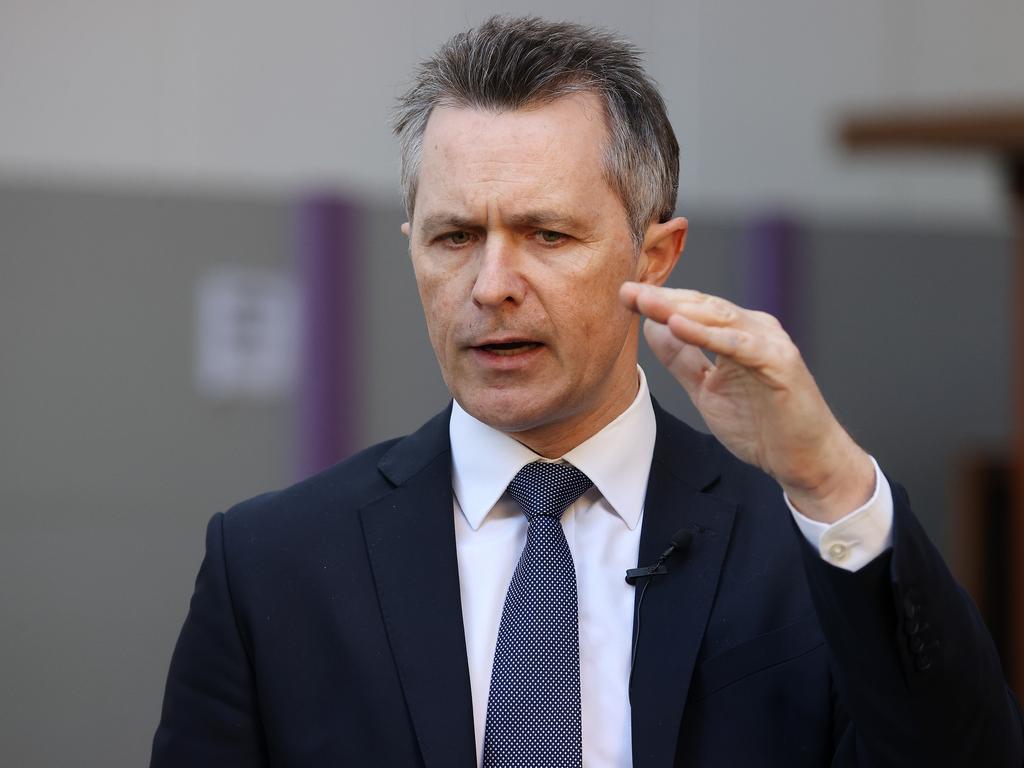Higher payments to students through ‘earn and learn’ reforms
Higher student welfare payments and paid work experience championed, with the nation’s first Student Ombudsman to be legislated federally.

Higher student welfare payments and paid work experience placements were championed by federal Education Minister Jason Clare on Sunday as he warned that poverty was forcing students to sleep in cars.
The nation’s first Student Ombudsman, to field complaints ranging from safety on campus to deficient degrees, is at the heart of the student-first approach to reform and will be legislated by the federal government.
The government will also force universities to prioritise the safety and welfare of students, with safeguards against sexual assaults and harassment mandated in a new code of conduct.
The Accord also puts a spotlight on course quality, recommending that all university tutors and lecturers be trained to teach.
“There is a need to improve the quality of learning and teaching,’’ it states.
“Students pay considerable fees and the review found there is a need to ensure they receive good teaching in return.’’
The Accord warned that “financial and personal struggles’’ are triggering too many students to drop out of their degrees.
It warned that it was becoming “more expensive and increasingly difficult for students to participate in and complete tertiary education without financial hardship, even poverty.’’
“Students deserve greater assistance with their cost of living while studying and the cost of degrees should align with prospective future earnings.’’
Mr Clare yesterday endorsed paid practicum placements, which would require state and territory governments to contribute to student payments through the schools and hospitals that employ university students for practicum placements.
“If you’re a nursing student, you’re spending 800 hours working in a hospital where you’re not paid,’’ he said yesterday.
“If you’re a teaching student, about 600 hours, through the course of your degree, in the classroom where you’re not paid.
“Often you have to give up your part-time job.
“Teaching and nursing students have told me they can’t afford to do the prac so they drop out, or end up sleeping in a car because they can’t afford to pay the rent or pay the bills.’’
The report says that juggling part-time study with paid work is the “new reality’’ for students, and recommends a Jobs Broker to match students with work in their field of study.
“The service should be free for students, and allow them to earn income while studying and reduce cost of living pressures,’’ it states.
“The Jobs Broker could operate through an online portal … where students can express their interest in available jobs based on their skills, qualifications, study commitments and region, and where employers can advertise available positions and their requirements.
“It would be a subscription service – free for students with employers paying a fee.’’

The Accord calls for changes to Austudy, Abstudy and the Youth Allowance welfare payments, so they can also be paid pro-rata to students studying part-time, based on hours of study.
The youth allowance is now paid to in full to students aged from 18 to 21, whose parents earn less than $62,634 per year – even if the students are not living at home.
The Accord recommends the parental income threshold be raised to $68,857 and pegged to inflation, or increases in male weekly earnings.
“Not all students can be supported to study by their families or partners,’’ the report states.
“As the higher education system grows, the income support system will need to do more.
“Income support payments for students have not kept pace with wages or the needs of students – resulting in a smaller proportion of students now receiving income support.
“It needs to be adjusted to prevent cost-of-living pressures deterring people from studying.’’
Students cannot access Austudy or Abstudy payments until they turn 25, meaning that younger students must rely on the youth allowance.
As revealed in The Weekend Australian, the Accord calls on governments to pay students who have to give up their part-time jobs to complete weeks or months of mandatory on-the-job placements in schools, hospitals and childcare centres.
Employers would pay students to undertake placements in other fields of study, such as engineering and accounting.
“There is a need to pay students for mandatory work placements,’’ the report states.
“The Australian Government (should) work with higher education providers and employers to introduce payment for unpaid placements, including government financial support for placements in the areas of nursing, care and teaching.
In other fields of study, it recommends that “industry and employers make reasonable contributions to the costs of providing placements, as they benefit from the pipeline of qualified people to fill jobs.’’

The report says practicum placements should “ensure that students gain industry relevant skills and experience without imposing onerous placement length and conditions’’.
“Providing financial support for placements is essential to ensure that enough students can meet their placement requirements without falling in to poverty and there are enough skilled graduates for further jobs,’’ it states.
National Union of Students president Ngaire Bogemann said the Accord was “a step in the right direction for student safety, welfare and wellbeing.’’
But she called for immediate action from the government to help 419,000 students living in poverty.
“The federal government must ensure tertiary students no longer have to make a choice between putting food on the table, paying their rent, and getting a degree,’’ she said.






To join the conversation, please log in. Don't have an account? Register
Join the conversation, you are commenting as Logout